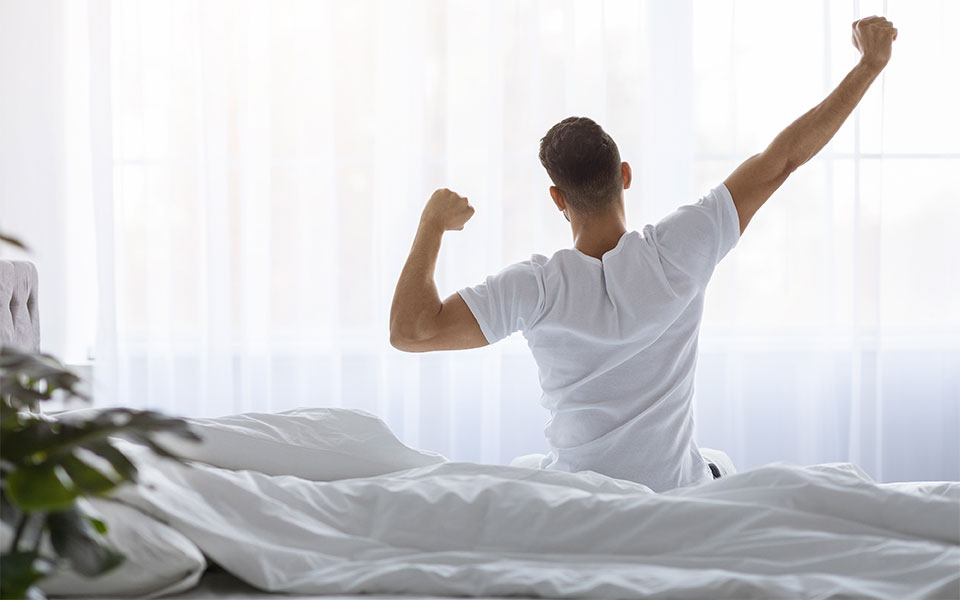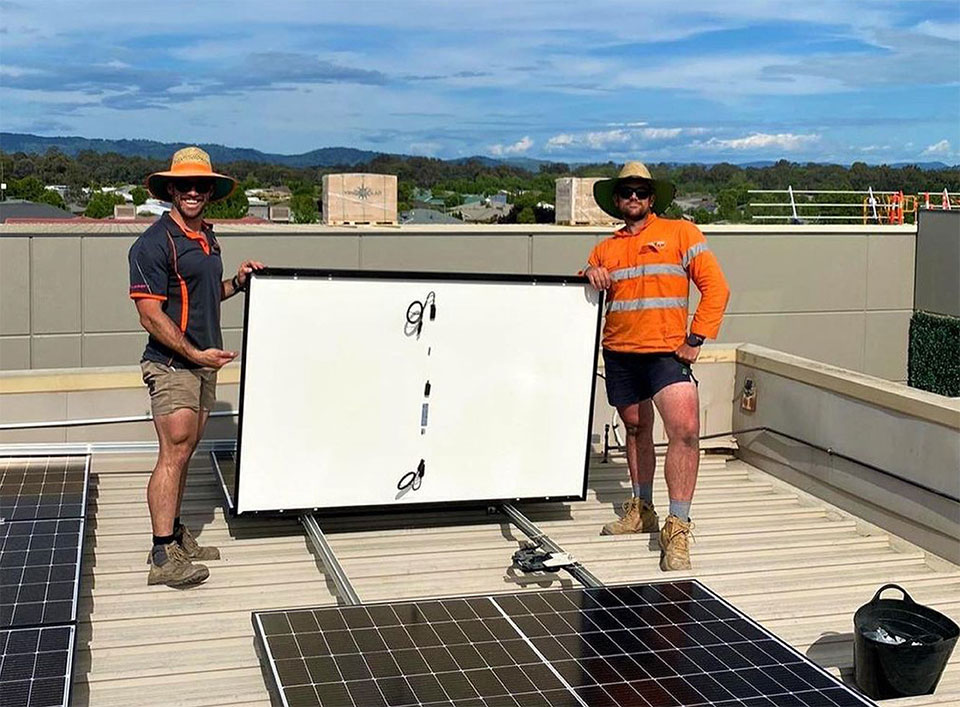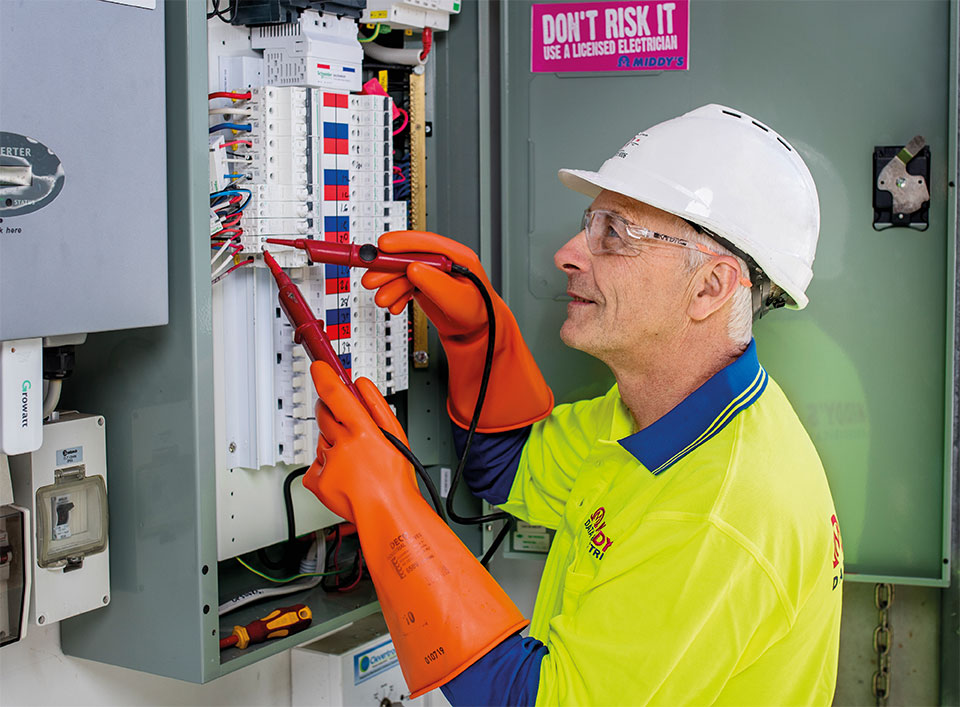Amp Up Your Energy
ShareHealth, safety and wellbeing advice enabling electricians to thrive.
30/06/2023
Industry Safety
News & Events

In this article we discuss wellbeing factors that contribute to a better lifestyle as well as common health and safety essentials to be adopted on the job site.
Diet:
For electricians who are commonly out on the road, between multiple job sites and maybe even a stop or two at Middy’s, it’s tempting to opt for convenience rather than packing healthy food to fuel your day. What you eat affects your physical health, your mood and mental wellbeing.The key to eating well is to enjoy a variety of nutritious foods from each of the five food groups. Eat for Health, the Australian Government Health information source, outlines the five food groups as:
- Grains
- Vegetables and legumes
- Fruit
- Lean meats and poultry
- Dairy
Aiming for a regular pattern at meal times is also important as a planned pattern of eating is more likely to include the recommended number of serves from each of the five food groups. You should set some time aside to sit down and eat, as spontaneous meals and eating on the go are more likely to include too many discretionary foods. You should also drink plenty of water throughout the day.
We recommend looking at eatforhealth.gov.au for more tips on healthy eating.

Sleep:
Being well rested is crucial for your overall health. Not only can a good 8 hours sleep help you wake up feeling refreshed and energised for the day, but it helps to prevent experiences of fatigue, poor concentration and memory, mood disturbances, impaired judgment and reaction time and poor physical coordination. A lack of sleep can even put you at higher risk of accidents and injury.Many in the electrical industry are on the job site before 7am, so not only is it important to get to sleep early the night before, but it’s also important that your sleep routine doesn’t fluctuate too much on the weekends. Staying out late on a Saturday night and then sleeping in on a Sunday can significantly disrupt your sleep routine.
Mental Health:
According to Beyond Blue, around one in two Australians will struggle with their mental health during their lifetime. Whether you find yourself or someone you know struggling, it’s important to know about the signs and symptoms to look out for and where to find support.Some common behavioural indicators of depression include:
- Not going out anymore
- Not getting things done at work or school
- Withdrawing from close family and friends
- Relying on alcohol and sedatives
- Not doing usual enjoyable activities
- Unable to concentrate
Looking after your mental health can involve reducing and managing your stress levels, maintaining a healthy lifestyle, cutting back on alcohol and drugs and taking action early if you’re feeling unsettled or struggling.
Beyond Blue has some fantastic resources on how you can do a mental health “check-in” on yourself, where to go to get help (most commonly starting with a GP) and how you can support someone else who is struggling. Remember, it’s ok to lean on your close friends and family if you’re not feeling your best.
If you are a NECA VIC member, you have access to a FREE Employee Assistance Program that caters to you, your team and immediate families. This is a confidential service that we encourage all electricians tap into when things are challenging. Utilise phone or face to face sessions, helping with a range of issues from a team of trained professionals.

Sun Protection:
Working in the electrical industry can mean that you spend a significant amount of time outdoors. Skin cancer is caused by over exposure to Ultraviolet (UV) radiation. Prevention is the key to avoiding skin cancer, it will also keep you looking younger.The Cancer Council’s guidelines indicate that when the UV level is three or above one should:
- Slip on some sun-protective clothing that covers as much skin as possible
- Slop on broad spectrum, water resistant SPF30 sunscreen. Apply 20 mins prior to going outdoors and every two hours afterwards
- Slap on a hat that protects your face, head, neck and ears
- Seek shade (when you can)
- Slide on some sunglasses
It’s also worth noting to be extra cautious in the middle of the day when the UV levels are most intense.
If you’re working outside a lot of the time, it’s generally recommended that you have a skin check once a year which can be done at your local GP. Find more information about sun protection and skin cancer on the Cancer Council website cancer.org.au
Health and Safety on the Job Site:
This should be standard practice for electricians, but for those who are new to the industry, work outside of the trade or those who just need a fresh reminder, here are the critical elements of maintaining a safe electrical working environment:PPE: Always wear appropriate PPE including safety glasses, gloves, safety footwear and if necessary, hearing protection and respiratory equipment.
Electrical Safety: Follow electrical safety procedures, such as isolating power sources, using lockout/tag-out procedures and testing for the absence of voltage before commencing work.
Electrical Isolation: Clearly label and isolate electrical equipment during maintenance or repair work to prevent accidental re-energisation.
Hazard Identification and Risk Assessment: Conduct a thorough assessment of the job site to identify potential hazards and assess the associated risks. Take appropriate measures to control and minimise these risks.
Emergency Procedures: Familiarise yourself with the site's emergency procedures including evacuation routes, fire extinguisher locations and first aid facilities. Report any accidents or incidents promptly.
Fall Protection: When working at heights, use appropriate fall protection equipment such as safety harnesses, guardrails or safety nets to prevent falls.
Ladder Safety: Ensure that ladders are in good condition, properly secured and used according to the manufacturer's instructions. Maintain three points of contact while climbing or working on a ladder.
Tools and Equipment: Use tools and equipment that are in good condition and appropriate for the task at hand. Inspect them regularly and report any defects or damage to the appropriate authority.
Manual Handling: Follow safe manual handling techniques to avoid strain or injury when lifting heavy objects. Use lifting aids or team lifting methods whenever necessary.
Ergonomics: Maintain proper posture and ergonomics while working to minimise the risk of musculoskeletal disorders. Take regular breaks and perform stretching exercises to reduce fatigue.
Communication: Ensure that someone else knows where you are at all times.
Electricians play an indispensable role in our modern society, ensuring the smooth functioning of electrical systems that power our homes, businesses and industries. So it’s important to remember that by prioritising investing in your physical and mental health, electricians can continue to be the driving force behind a brighter, safer and more productive future.

NECA’s HSEQ Plus, Safety Management System is specifically designed for the electrotechnology industry and allows you to meet the minimum requirements to exhibit duty of care and compliance requirements. It features key documents (SWMS, SOPs, WHS Management plans), forms and toolbox talks to get you started. The best part is it is fully customisable to your company and comes with an app that you can use on site. You can find out more about the product at necavic.asn.au.
For a non-obligatory chat, contact NECA on 1300 300 031 or reach out via email at safety@neca.asn.au.

